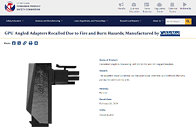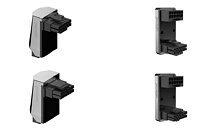T0@st
News Editor
- Joined
- Mar 7, 2023
- Messages
- 2,819 (3.72/day)
- Location
- South East, UK
| System Name | The TPU Typewriter |
|---|---|
| Processor | AMD Ryzen 5 5600 (non-X) |
| Motherboard | GIGABYTE B550M DS3H Micro ATX |
| Cooling | DeepCool AS500 |
| Memory | Kingston Fury Renegade RGB 32 GB (2 x 16 GB) DDR4-3600 CL16 |
| Video Card(s) | PowerColor Radeon RX 7800 XT 16 GB Hellhound OC |
| Storage | Samsung 980 Pro 1 TB M.2-2280 PCIe 4.0 X4 NVME SSD |
| Display(s) | Lenovo Legion Y27q-20 27" QHD IPS monitor |
| Case | GameMax Spark M-ATX (re-badged Jonsbo D30) |
| Audio Device(s) | FiiO K7 Desktop DAC/Amp + Philips Fidelio X3 headphones, or ARTTI T10 Planar IEMs |
| Power Supply | ADATA XPG CORE Reactor 650 W 80+ Gold ATX |
| Mouse | Roccat Kone Pro Air |
| Keyboard | Cooler Master MasterKeys Pro L |
| Software | Windows 10 64-bit Home Edition |
CableMod issued a statement—just before the last Christmas holiday—detailing a safety recall of 16-pin 12VHPWR angled adapters, version 1.0 and 1.1. This announcement received widespread media coverage (at least in tech circles), but some unfortunate customers have not yet received the memo about faulty adapters—CableMod's 90° angled and 180° hard connectors can overheat and in worst case scenarios, actually melt. HotHardware, amusingly named given this context, was the first hardware news outlet to notice that the Consumer Product Safety Commission (CPSC) had published a "GPU Angled Adapter" recall notice to its website earlier today, under "Recall number 24-112."
The US government body's listing outlines aforementioned hazardous conditions, along with an estimated 25,300 affected unit count. The CPSC's recommended "Remedy" advice is as follows: "Consumers should immediately stop using the recalled angled adapters and contact CableMod for instructions on how to safely remove their adapter from the GPU and for a full refund, including cost of shipping, or a $60 store credit for non-customized products, with free standard shipping. Consumers will be asked to destroy the adapter and upload a photo of the destroyed product to https://cablemod.com/adapterrecall/. The instructions on how to safely remove the adapter are also located on that site. Once destroyed, consumers should discard the adapter in accordance with local laws." The Safety Commission has gathered some customer feedback intelligence on this matter: "The firm (CableMod Ltd., of China) has received 272 reports of the adapters becoming loose, overheating and melting into the GPU, with at least $74,500 in property damage claims in the United States. No injuries have been reported."



HotHardware believes that the recall of faulty CableMod parts will not absolve every owner of flagship Ada Lovelace graphics cards from experiencing scary + melty incidents: "Interestingly enough, YouTuber Northridgefix also posted videos on various GeForce RTX 4090 GPUs that have had issues with damage. While this may or may not be related to any potential adapters, it surely adds to the perceived issues at hand. This makes owners of these GPUs want to double check their expensive piece of hardware more frequently out of caution, even if incidence rates are low."
View at TechPowerUp Main Site | Source
The US government body's listing outlines aforementioned hazardous conditions, along with an estimated 25,300 affected unit count. The CPSC's recommended "Remedy" advice is as follows: "Consumers should immediately stop using the recalled angled adapters and contact CableMod for instructions on how to safely remove their adapter from the GPU and for a full refund, including cost of shipping, or a $60 store credit for non-customized products, with free standard shipping. Consumers will be asked to destroy the adapter and upload a photo of the destroyed product to https://cablemod.com/adapterrecall/. The instructions on how to safely remove the adapter are also located on that site. Once destroyed, consumers should discard the adapter in accordance with local laws." The Safety Commission has gathered some customer feedback intelligence on this matter: "The firm (CableMod Ltd., of China) has received 272 reports of the adapters becoming loose, overheating and melting into the GPU, with at least $74,500 in property damage claims in the United States. No injuries have been reported."



HotHardware believes that the recall of faulty CableMod parts will not absolve every owner of flagship Ada Lovelace graphics cards from experiencing scary + melty incidents: "Interestingly enough, YouTuber Northridgefix also posted videos on various GeForce RTX 4090 GPUs that have had issues with damage. While this may or may not be related to any potential adapters, it surely adds to the perceived issues at hand. This makes owners of these GPUs want to double check their expensive piece of hardware more frequently out of caution, even if incidence rates are low."
View at TechPowerUp Main Site | Source





